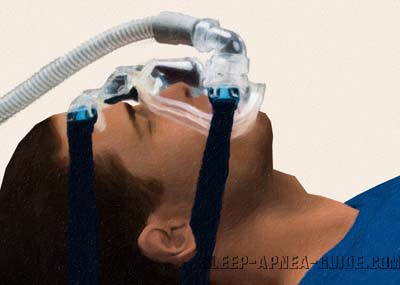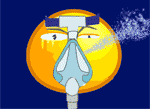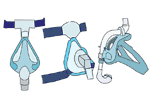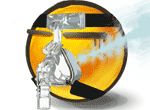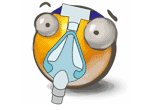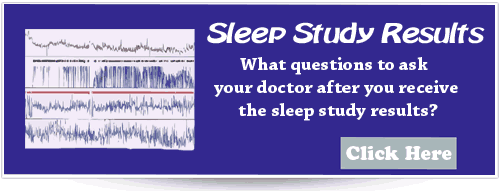CPAP Mask
Getting Fit With the Right Sleep Apnea Mask
Choosing the right CPAP mask is probably the key for a successful CPAP treatment. You will need a mask that fits comfortable on your face, without leaks. Having a poor fit makes the therapy unbearable.
No one is more interested to have a good mask than you do (not even your doctor), so the more you know about this subject, the better chances to find the best sleep apnea mask.
In this page you'll learn:
- the types of CPAP masks,
- how to choose the right type of mask for your face,
- how to test a sleep apnea mask before buying,
- mask fitting tips,
- how to overcome the most common sleep problems with your mask.
Types of CPAP Masks
There are different styles and designs available on the market. In addition, each type of mask is available in various sizes, such as small, medium and large.
Choosing The Right CPAP Mask
Before shopping - choosing the right type of mask
Before going to the CPAP equipment supplier, you need to know about your:
- doctor recommendation for a sleep apnea mask,
- the size and shape of your face - the mask has to "follow" the shape of your face or nasal orifices to minimize leaks,
- shape and size of your nose - to avoid the excess pressure from the mask frame (if it's a nasal or full face mask),
- shape and size of your nasal openings and interior passages - if you want to use nasal pillows, these interfaces have also different shapes and sizes. Find the ones for your nose,
- sleep position - some masks work better for side sleeping, others for sleeping on the back.
- type of comfort - are you claustrophobic? Then a full face mask will be difficult to tolerate. Are you a mouth breather? Then nasal mask or nasal pillow will not work without the help of CPAP chin strap.
While you're shopping - testing the masks before buying
You should already have an idea of what type of mask will work for your face. Now it's time to test the masks that you prefer.
To find the best mask style and size, you may want test a couple of them in the supplier (DME) shop. It's better to have your CPAP machine with you, to have a real feel of the mask.
Here is how to fit the mask to your face in the shop:
- connect the mask to your CPAP machine,
- turn CPAP on and place the mask on your face with the straps loose,
- find a place where you can lay down in your normal sleep position (on the back, or on the side),
- now pull the straps slowly, until you have a good seal.
Choosing the Right Mask in the CPAP Equipment Shop Supplier

- It is very important that the CPAP sleep mask has the right size or shape, to be sealed on your face.
- Test a mask before you buy it.
- See if the mask has the right size for you and check the air leaks. Air leakage around the mask and irritation of the bridge of the nose are two of the most common results of a poor fit.
- When you test the mask, make sure that is not too tight. It should fit securely and comfortably on your face. Many patients find that they need to experiment with the mask for a while to get a comfortable fit and without air leaks.
- If you are a mouth breather, try a full face mask or a chin strap.
- Try a smaller mask, or a larger one. All masks come in many sizes, so don't be shy to ask the vendor about other sizes.
To learn how to test and select the best mask in the DME shop, see Sleep Apnea Mask Selection.
CPAP Mask Problems
If you shop wisely, and try different masks, you should be able to find the best mask for your face.
However, some CPAP users still have problems with their mask.
Here are the most common problems:
- air leaks,
- taking the mask off during sleep,
- uncomfortable seating on the face,
- claustrophobia,
- skin irritation,
- water in the mask or tube,
- dry mouth.
To learn how to deal with these problems and how to prevent them in the future, see Problems with CPAP masks.
Bottom line recommendation?
I hope these tips will be useful for you. In these times, your best ticket to a good quality of life is CPAP therapy. You should understand that your CPAP mask is the Grail to the perfect treatment for sleep apnea.
Without a good mask, your CPAP machine is almost useless.
Related Articles to Sleep Apnea Masks
More Sleep Apnea Articles:
Back from CPAP Mask to Sleep Apnea Guide home page
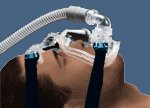
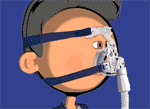
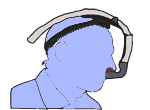
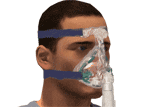
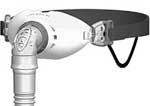 - these masks allow to use only the mouth to breathe the air from CPAP.
Because it uses just the mouth, it's necessary to have heated humidification to prevent dryness of the oral tissues.
Recommendation:
- these masks allow to use only the mouth to breathe the air from CPAP.
Because it uses just the mouth, it's necessary to have heated humidification to prevent dryness of the oral tissues.
Recommendation:
 - this interface covers the mouth and has nasal pillows for your nose. So, it doesn't cover your nose to cause skin irritation.
Recommendation:
- this interface covers the mouth and has nasal pillows for your nose. So, it doesn't cover your nose to cause skin irritation.
Recommendation:
